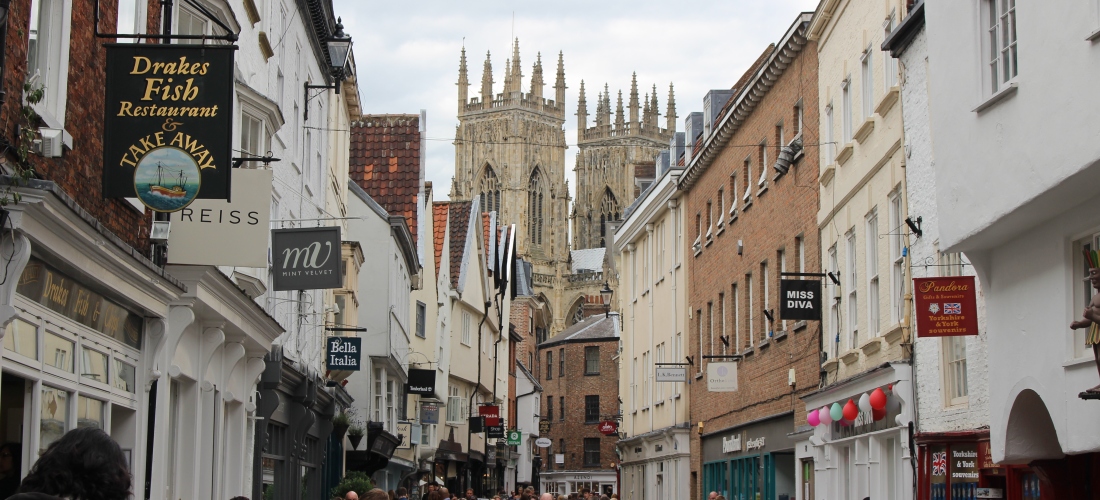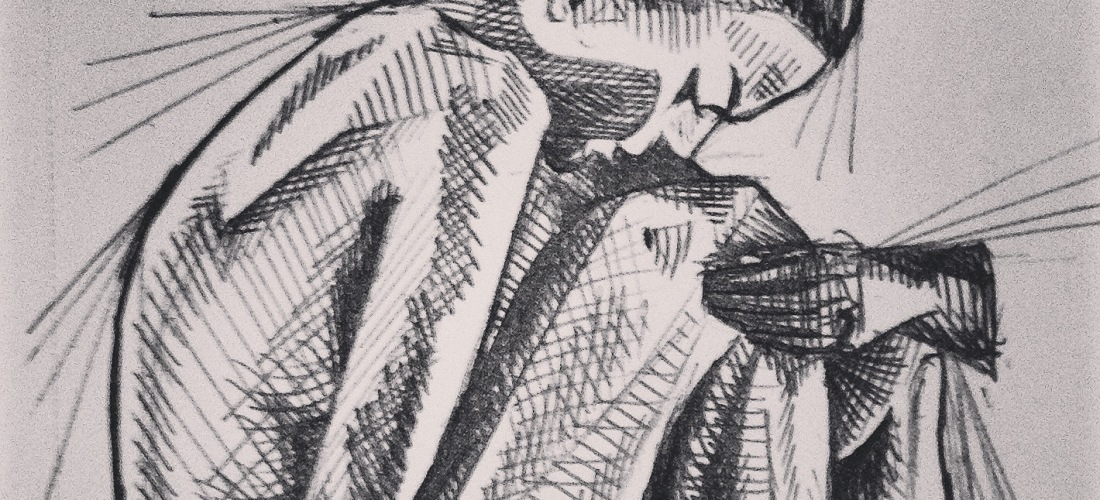Three weeks ago today I got handed a piece of paper and my degree at the University of York was over. There was a fancy outfit involved, not to mention a nerve-wracking walk across a stage to shake the hand of a man in a gold-tasselled hat, but essentially what the day boiled down to was the presentation of a certificate that was meant to quantify the last three years spent in this beautiful city.
Overall, it was a good day: I enjoyed wearing the dress I’d combed what felt like the whole Internet to find; I enjoyed reuniting with my friends and wearing my graduation gown. I even enjoyed the terror-inducing walk across the stage in front of a roomful of peers and parents. (Note: if I have to list a drawback, I didn’t really enjoy the hat. I now understand why it’s traditional to violently throw them when the ceremony is over.) The sun shone and York shone with it – and for those that haven’t seen it, York in the sunshine is the most beautiful place on Earth.

However, I couldn’t help feeling that the whole ceremony, all the pomp and bluster of graduation, was somewhat disconnected to what being a student at York had actually meant to me in the three years I spent there. Yes, they were three years spent working (very hard, I flatter myself to think), to get a degree in English Literature: three years of seminars and office hours, of mild hero-worship of various members of staff. But they were three years, also, of moments spent in other places than the library, at other tasks than reading. Where, for example, was the piece of paper that quantified my excursions up and down the banks of the River Ouse, under gold skies or grey, strolling beneath sycamores to the city centre? Where was my certificate declaring my abiding love for the York Minster: for standing in its colossal shadow amid the tolling of its bells? Where, I ask, was the formal acknowledgement of all the bar crawls over cobbles? The deeply personal attachments formed to York’s bookshops and their proprietors? Where was the paper goodbye that I was promised?
Looking back over my time at university, a piece of paper and a handshake was never really going to cut it.

I arrived in York three years ago wholly unprepared for the ordeal of moving away from home and starting my adult life from what felt like scratch. I was so overwhelmed on my first night that I didn’t even make it out for the first night of Freshers Week. Sleep-deprived and overly emotional, what was supposed to be a sik club night transpired as many hours of hysterical crying on the phone to my boyfriend. There are many explanations for this, the main one being that, while I may have looked (arguably) like a young adult equipped for change, I was actually a tiny baby in a grown-up-human suit, who felt wrenched up by the roots from everything that made me comfortable. After a summer in which I’d never not been busy, being without a foundation of people who knew me and cared about me, not to mention living in a place that I’d only visited once before was paralysing. I felt miserable – and, ultimately, embarrassed. Embarrassed that I could go from being someone who rarely cried to someone who cried nearly every day; embarrassed that anyone was seeing me like this, let alone forming their first impressions of me on this basis; embarrassed, most of all, that I was not having the uni experience everyone expected, and which everybody else seemed to already be enjoying.
 To cut a long story short, what followed this initial grieving period was me growing the fuck up. Instead of crying about the things that stressed me out – the main one of these being, predictably, money – I made proactive steps for the first time to be on top of them (in terms of the money, it was very sophisticated; there was a spreadsheet involved). I became more independent in other ways: I explored my new city alone, carving out familiar paths through unfamiliar streets, falling in love step by step, oddly-named passage by oddly-named passage. So much of my development into a somewhat-functioning human being happened in York; so much of my personality is coloured by its streets and students that leaving, much like arriving, felt somewhat like a bereavement.
To cut a long story short, what followed this initial grieving period was me growing the fuck up. Instead of crying about the things that stressed me out – the main one of these being, predictably, money – I made proactive steps for the first time to be on top of them (in terms of the money, it was very sophisticated; there was a spreadsheet involved). I became more independent in other ways: I explored my new city alone, carving out familiar paths through unfamiliar streets, falling in love step by step, oddly-named passage by oddly-named passage. So much of my development into a somewhat-functioning human being happened in York; so much of my personality is coloured by its streets and students that leaving, much like arriving, felt somewhat like a bereavement.
 People often push to define university as just one thing – for example, politicians currently seem to be going for “financially crippling” – but the truth is that three years is a long time. It’s easy to look back at my memories of my first night on York campus and to feel that it was wasted time, to paint my first year with the brush of misery and vow never to speak of it again, to imagine that it got better like a light coming on at the beginning of second year. But that’s not the way it was. Yes, my debut at Freshers Week was a teary disappointment, but the next night I went to pre-drinks in the grotty dining room next door, stayed out til 4am and, actually, met most of the people whose company would see me through the next three years. Yeah, I still cried the next day, and the day after, and for a good few days after that probably. To be honest, if you had to take a bet on what I was doing on any given day in October 2013 you’d get good odds on “having a little sob.” But my time at York, despite or even because it began so miserably, turned out to be the best thing that’s happened to me in my life so far, and has meant so many different things. Inside its walls and out, York was the scene of so many intrigues and triumphs and elations and commiserations, so much of my growing up, that it’s no wonder all of them didn’t fit under the roof of Central Hall – a building only a stone’s throw away from the bedroom I thought I’d never learn to love, in the place I thought would never feel like home.
People often push to define university as just one thing – for example, politicians currently seem to be going for “financially crippling” – but the truth is that three years is a long time. It’s easy to look back at my memories of my first night on York campus and to feel that it was wasted time, to paint my first year with the brush of misery and vow never to speak of it again, to imagine that it got better like a light coming on at the beginning of second year. But that’s not the way it was. Yes, my debut at Freshers Week was a teary disappointment, but the next night I went to pre-drinks in the grotty dining room next door, stayed out til 4am and, actually, met most of the people whose company would see me through the next three years. Yeah, I still cried the next day, and the day after, and for a good few days after that probably. To be honest, if you had to take a bet on what I was doing on any given day in October 2013 you’d get good odds on “having a little sob.” But my time at York, despite or even because it began so miserably, turned out to be the best thing that’s happened to me in my life so far, and has meant so many different things. Inside its walls and out, York was the scene of so many intrigues and triumphs and elations and commiserations, so much of my growing up, that it’s no wonder all of them didn’t fit under the roof of Central Hall – a building only a stone’s throw away from the bedroom I thought I’d never learn to love, in the place I thought would never feel like home.
On my last solitary walk through York the day after I graduated, feeling the farewell left unsaid at the ceremony, I kept asking myself how it is that you say goodbye to a place that has meant so much to you, that has so much of you in it. I went to the pub with my friends still wondering, and remembered after a few weeks apart from them how easily they make me feel better about everything, in this case my imminent departure from the best place in the world. There’s no piece of paper that can sum up everything I’ve learned in York. How will I say goodbye to this amazing place? Short answer: I won’t.

“You get a strange feeling when you’re about to leave a place, I told him, like you’ll not only miss the people you love but you’ll miss the person you are now at this time and this place because you’ll never be this way ever again.”
– Azar Nafisi, Reading Lolita in Tehran


